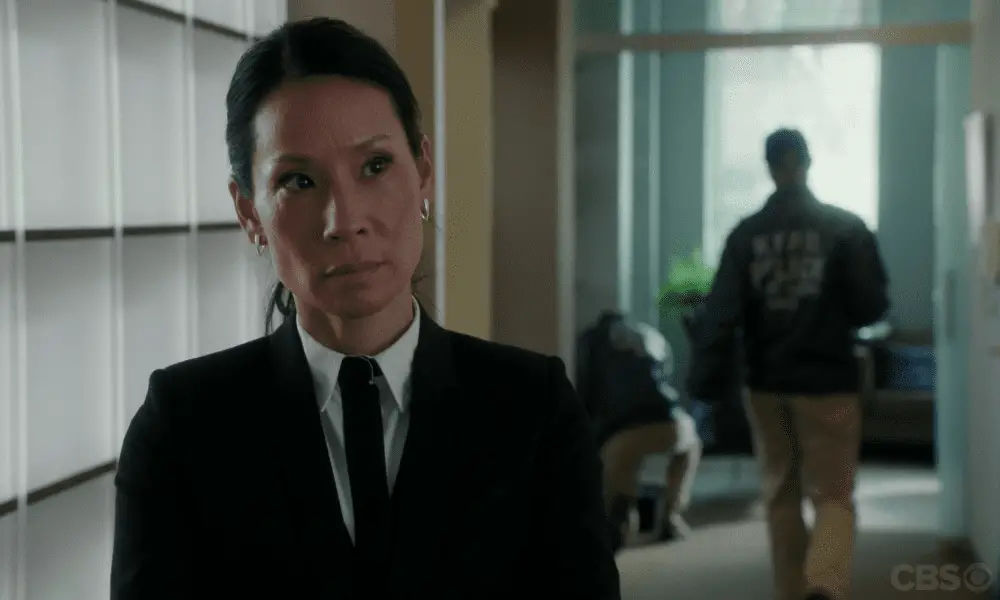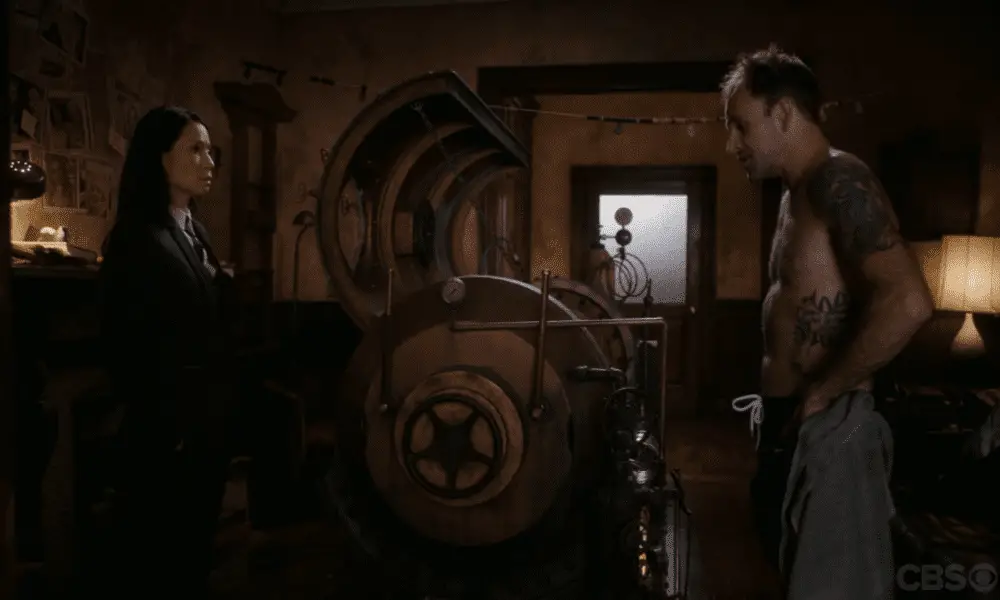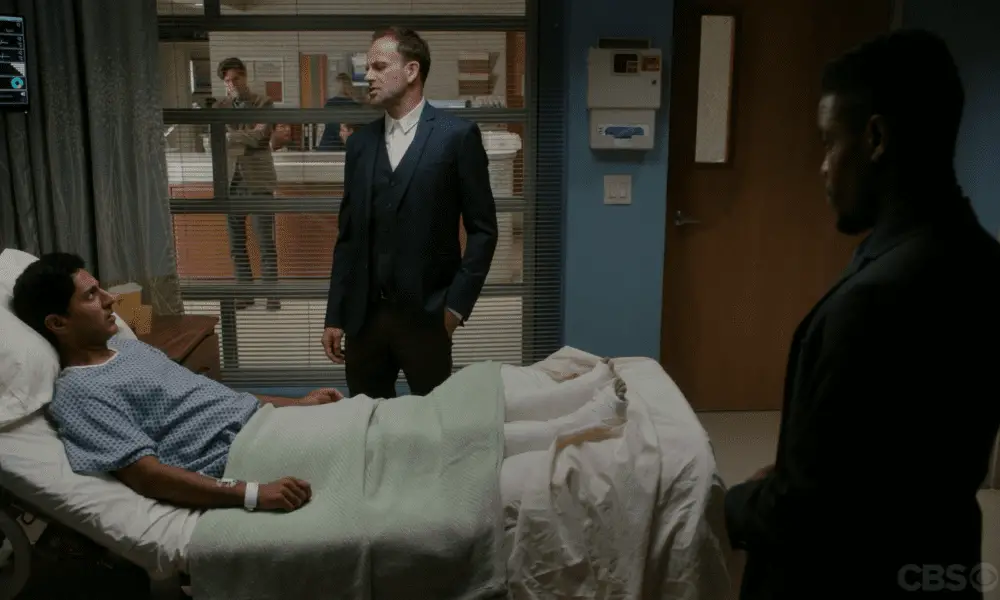Last week we had one classic murder-of-the-week trope with historical reenactment. This week we’ve got another trope and I’m not as big a fan of this one: the murder of a psychologist. I want to warn that there’s a suicide attempt in this episode, so tread carefully.
Sherlock has come up with a clever new way of dealing with his PCS and has been spending spare time in a sensory deprivation tank. Unlike every sci fi show ever, this doesn’t lead to a surreal out-of-body experience. Joan pulls him out and they discuss their current caseload. Last week’s episode ended with Michael sharing the case of the “missing” young woman that Michael buried in the woods. Sherlock, not knowing about that last part, isn’t too concerned. The woman, Polly Kenner, is a recovering addict who has a tendency to relapse and vanish. Sherlock assumes it’s more of the same and the case is put on the back burner.
The police have another new case for them. A psychologist, Dr. Candace Reed, has been murdered in her office. Fifty stab wounds, blood everywhere. The victim isn’t just anyone, as it turns out. Back in season one, when Joan was trying to decide whether to stay as a sober companion or not, she saw a therapist. Yes, the very same one.
One of the reasons I’m not a fan of the therapist-getting-murdered trope is that usually the patients are the first suspects. Everyone knows that mentally ill people are oh-so-scary and violent! But as soon as the detectives’ thoughts turn in that direction, Sherlock points out the very true fact that the majority of mentally ill people are not and never will be violent. That makes me feel better…even though approximately three seconds later they still say the murderer was probably a patient. Sigh.
Sherlock asks Joan if she’s okay to work the case considering her personal connection. Joan brushes him off, saying that she only saw Reed for a brief time several years ago. Reed had a partner in her office, a Dr. Demopoulos, whom they interview. He claims to have left the office earlier than Reed the previous night to meet privately with a patient. The police want Reed’s patient records, but Demopoulos (rightly, in my opinion) insists that would violate doctor-patient confidentiality. Still, Bell thinks they can figure out patients’ identities based on Reed’s phone records and so on. Meanwhile, Joan and Bell head out to talk to Reed’s husband while Sherlock continues to examine the crime scene.

Reed’s husband is visibly grieving and has an alibi. His wife didn’t have enemies but sometimes she would talk about her clients. She had mentioned one weird client who had seemed overly invested in her and sometimes showed up without an appointment. But Reed never mentioned any patient names in order to protect their confidentiality. Again, as she should.
Joan and Sherlock reunite at the brownstone to discuss their separate findings. Joan’s minimal description of the weird client means something to Sherlock. Because he…wait for it…stole a hard drive with all of Reed’s patient files. I don’t know how to convey my feelings about that other than typing “yikes” in all caps, so here I go. YIKES.
Sherlock doesn’t think it’s improper of him to have done that, although Joan does at least point out its a privacy violation. Sherlock reasons that the information is protected because general society unfairly judges the mentally ill, and he’s above that. And, sure, that’s one reason, but there are many others and…let’s say it again. YIKES.
Joan wonders if her patient files are in the hard drive. They are, but Sherlock has refrained from looking at them, at least. What a gentleman. (I know sometimes these things can be hard to convey through text, so that’s, uh, sarcasm.)
Based on Joan’s info, Sherlock is able to identify the weird patient as one Alphonse Kapoor, a corporate accountant. He once bit a coworker in a fit of rage and was referred by his boss to Reed. I too am neurotic and have a lot of rage, so I get it.
To continue my pattern of seeing characters on this show and thinking “Omg, it’s so-and-so from that other show,” Kapoor is played by Jonathan from 30 Rock. Kapoor is extremely shaken by the news that Reed has been murdered and begins to have a panic attack. Saying he needs air, he goes out onto his balcony. Remember that trigger warning from above? Here we go.
Trying to give him space, Joan and Sherlock turn their back on Kapoor on the balcony. They’re convinced by his display of grief. Sherlock brings up that he thinks that Joan secretly wants to look at her file from Reed. But they don’t get far in the conversation, because while they aren’t looking, Kapoor jumps from the balcony.

But to my relief, he survives the fall. Sherlock spends the night at the hospital to make sure he’s okay, which is actually very sweet. Kapoor jumped because Reed had helped him so much that he couldn’t imagine going on without her, not because he felt guilt over killing her. Sherlock assures him that he believes Kapoor is not the killer. Unfortunately, Kapoor’s alibi isn’t very strong. He was at a business meeting at the time of Reed’s death, but a non-disclosure agreement means he can’t say who he was with, other than his employer. He asks Sherlock to speak to the man, a Sydney Place.
Sherlock has the opportunity soon, because Place is bringing Kapoor some files for work. You know, the day after his suicide attempt. I do love this show’s consistent lowkey criticism of the Evils of Capitalism. Place confirms Kapoor’s alibi and creepily tells Sherlock that Kapoor is “special,” as was Dr. Reed. He knew her because he owned the building in which her offices were located. Place points Sherlock to Dr. Demopoulos. Reed and Demopoulos had argued in the past about Demopoulos’s money troubles.
Lin shows up at the brownstone to meet Joan. When Lin hears that the case they’re currently working on involves Joan’s previous therapist, she’s concerned. Joan confesses that she gave in and read Reed’s patient file on her. It upset her. Reed had written that she thought that Joan should be a mom and now Joan is worried she missed out on something. I have some thoughts on this, hoo boy.
One of the things I love about any and all interpretations of Sherlock Holmes is that he’s a man that, on the one hand, is all about logic. On the other hand, you know he lives for the drama. He melodramatically tells Demopoulos that he can clean away Reed’s bloodstains but he can never clean the stain of murrrder from his soul.
Demopoulos defensively admits that he owed Reed money, but says he paid it all back. The patient he was seeing the night of the murder confirms his alibi. Now that Reed has died, Demopoulos is working with Kapoor, and he storms off angrily to meet him. Sherlock and Joan decide to take advantage of his absence to restore the stolen hard drive. But they discover something unfortunate. There’s a listening device in Reed’s office, a device that surely heard them discussing their illegal theft.
The listening device is standard issue and doesn’t them much in clues as to who placed it. But Sherlock notes its covered in dust, so it must have been there awhile. Whoever bugged the office must have also heard the murder, and yet no such recording has been made available to the police. This suggests that the listener is either themselves the murderer or that they perpetrated some other crime against Reed. That was a weird line to me, because of course they did. They placed a listening device, which is illegal unless Reed consented to it. Fun fact that everyone should know: in most states, it is illegal to record conversations unless one or both members consent to it.

Sherlock and Joan also wonder whether the point of the device was to listen to Reed or to her patients. They turn to Kapoor again. He worked with many wealthy corporations and according to Reed’s files, he liked to talk about his work. Maybe he talked about something he shouldn’t have. But why not kill him as well as Reed if that was the issue?
Remembering that Sydney Place owned the building in which Reed’s offices were located, Sherlock goes to meet him again. More melodramatic accusations. Sherlock accuses Place of…placing the bug. Curse you and your puns, Elementary writers! Place points out that if he hypothetically had placed the bug, he would have heard Sherlock and Joan stealing the hard drive. If Sherlock tells the police about the bug, Place will tell them about the theft of evidence. Mutually assured destruction. But Sherlock, I think bluffing, says that the repercussions for him won’t be as bad as they will for Place and his firm. They strike a bargain. The tape in exchange for Sherlock’s discretion.
Joan and Lin further discuss Joan’s therapist’s notes. Lin wins my eternal admiration in this scene. She argues that Joan’s therapist was wrong. Joan isn’t incomplete just because she isn’t a mom. The traits that her therapist said would make her a mom, such as her kindness and caringness, also make her a great detective. Lin is taking the words right from my mouth.
I’ve discovered the real reason the writers gave Sherlock a sensory deprivation tank. Not for sci fi hallucinations, but so that we could all get a nice view of his tattoos as he climbs out shirtless. But he emerges to find he’s not alone. A creepy dude is watching him. Sherlock recognizes him; he’s the “fixer” from Place’s firm. The fixer does not have the tape from the listening device. He destroyed it, but first he listened to it and he insists that it didn’t reveal the killer’s identity. Sherlock demands that the fixer shares what he did hear. The killer was mostly silent and killed Reed before she could say anything, but the killer did say one thing. The fixer thinks it’s a nonsense phrase, but it means something to Sherlock.
Some more dramatics and a clever plan later and Bell and Sherlock have tricked the killer into revealing himself. You know, I wonder if Sherlock was a theater kid as a teenager.
The episode ends with a scene of Joan in the brownstone, taking advantage of Sherlock’s tank time to make some calls. She’s speaking with lawyers. The camera pans out to reveal that on her laptop, she was looking up information about adoption.

Thoughts:
- I’ve called Elementary out before for suggesting the mentally ill are more likely to be violent. I appreciated this episode specifically refuting that idea. Regardless, some of this episode’s handling of mental illness made me feel gross.
- I hate how “psychopath” and “sociopath” get tossed around as if they’re scientifically meaningful terms even though they aren’t even in the DSM.
- Joan’s motherhood. Let’s get into it. I am conflicted!
On the one hand, as I discussed with regards to Kitty’s storyline last season, it frustrates me that many TV shows act like a woman’s storyline isn’t complete or happy unless she has a child. I’m glad that Lin called out that idea, but that doesn’t mean the show isn’t still playing into it. Plus, the suggestion that because a woman is kind and caring, she’s therefore perfect to be a mother is absurd. What, are all childless women self-centered, icy monsters- oh wait. That is what society thinks. But you know what, a woman can be kind and not be cut out to be a mom.
On the other hand, it’s a reality of life that many women do want and have children, and fiction absolutely should represent that reality!
On the third alien hand, there’s been two major female characters on this show, Kitty and Joan, and if both end up having children, once again, I feel that that suggests that’s an inevitable part of a woman’s life. You don’t see Sherlock and Bell having kids, do you?
But on the fourth mutant hand, I appreciate the portrayal of non-conventional forms of motherhood. A lot of shows act like if a woman can’t biologically conceive, it’s all over, but Joan goes straight to adoption as if it’s no biggie. Joan is also single. A storyline about a single woman adopting a baby is pretty cool. - On the fifth robot hand of pure, simple bias…Stories about unique, non-romantic relationships are my jam. I don’t necessarily want Joan to have a kid, but I am excited about the idea of Joan and Sherlock platonically raising a kid together. Wow, they’d be weird parents.
Images courtesy of CBS

